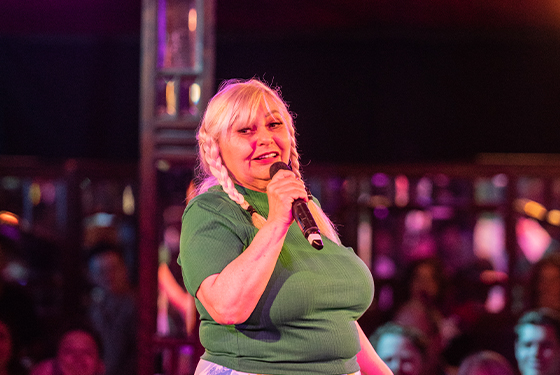Adelaide Fringe Ambassador Penny Arcade's Insights on ‘Queer’ Art and History
Sun, Jun 18 2023
“Bitch, Dyke, Faghag, Whore” was the name of 2023 Adelaide Fringe ambassadors first show at Fringe over 20 years ago. We had an enlightening chat with Penny for Pride Month about her experiences as a queer person, finding her community and activism in New York across the 60s, 70s, 80s, and 90s.

What was it like being part of the Queer scene in New York and how did that help develop your work as an artist?
Well outsiders have always gravitated to queer scenes. In the 1960’s gay bars were sanctuaries for people who were not only queer but different from “straight” society. Straight then meant conservative, not heterosexual.
Queer and gay society had space for ideas then and your ability to hold a conversation was considered the highest and most sought after ability - if you were beautiful but dumb, well if you were only beautiful you were considered a trick.
The respect for individuality - in thought and all forms of expression that was central to the queer world then is what helped me develop into the artist I became.
Did you feel part of a community and if so how?
Well it is hard to explain to younger people but being queer was illegal so you were automatically a criminal and considered a degenerate.
I was conscious of being bisexual from the age of 5 or 6 and I grew up with a feeling of stigma and fear and so did everyone else and the sense of community was formed by sharing that history with people from all walks of life.
We were family to each other because most of us were estranged from our biological families
My mother found out I was a lesbian when I was 17 because I had confided it to a cousin who told her mother and her mother called my mother. You cannot form community just on one’s sexuality…you form community on your shared life experience.
You were part of a radical time in history for queer people, has this shaped the work you make?
When you grow up surrounded by lies you are starved for the truth and that gives you a profound love of the truth. You had to be brave and have the courage of your convictions to be out in the 60's, 70's and 80’s. We loved each other passionately because of the reality we shared and what we sought most of all was the truth in all things. This had a profound impact on my work.
Do you feel a difference between queer art now and when you first started? Have you enjoyed seeing this evolve?
I wonder what is meant by queer art. There is no queer art. There are queer people who make art. "Queer" Art became a marketing term in the 1990's.
There is queer content and I certainly am one of the artists who proved that a wide audience that did not themselves necessarily identify as queer could enjoy and be uplifted by a queer point of view or queer content whatever their sexual orientation might be. That is evolution.
And yes I did enjoy doing that and being that person (among others) who sought to transcend the institutions of hatred and oppression and share the good news that we are all one and that one's sexual orientation is the least important aspect of a human being.
Stonewall was a crucial part of Queer history, what is something you think people can take away from it?
The truth is that you cannot separate Stonewall from the political uprisings of the 1960’s in relation to civil rights and anti racism, in relation to stopping the war in Vietnam, in relation to Women and Abortion Rights, housing rights etc .
The Stonewall was not just part of queer history, it was part of the history of the radical left movement and when that is not understood, then what gave the Stonewall power to overthrow a societal wrong is not understood and therefore diminished.
While the very first night of the Stonewall rebellion was mainly Gay Street kids, the punch that ignited gays fighting the police was thrown by a black butch Lesbian named Storme DeLarverie who has been cut from the true history (not a Black Transwoman and not Marsha P Johnson who was neither there the first night nor Trans but who identified as a Queen) but the riots went on for three days and It was not only gay people who came to protest at Stonewall, but there were Communists, Socialists, Black Panthers, Feminists, Ecologists, Anti War people etc.
People who were fighting police control at every other demonstration, came to protest. We formed coalitions then - we came together because the people united can never be divided. Now the focus is continually on single issues - that is ok but it lacks the power of the people united against every form of tyranny.




